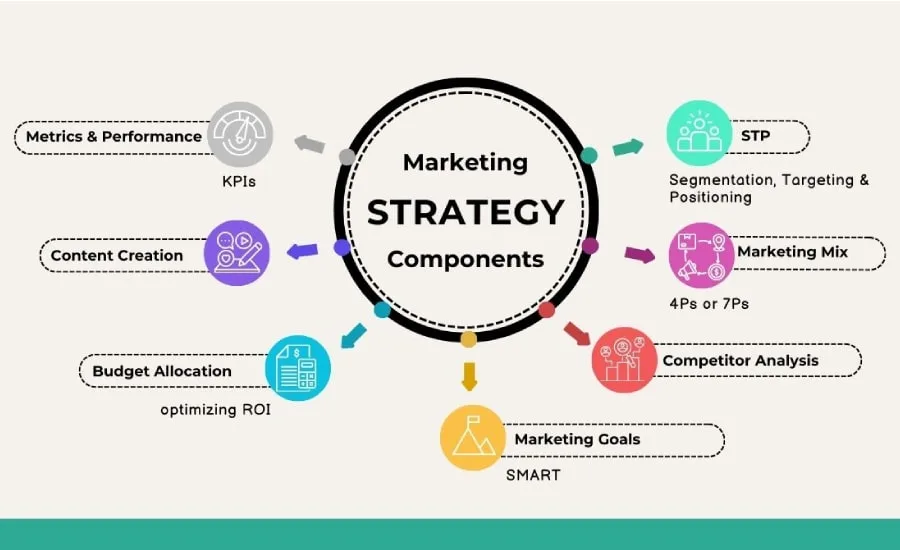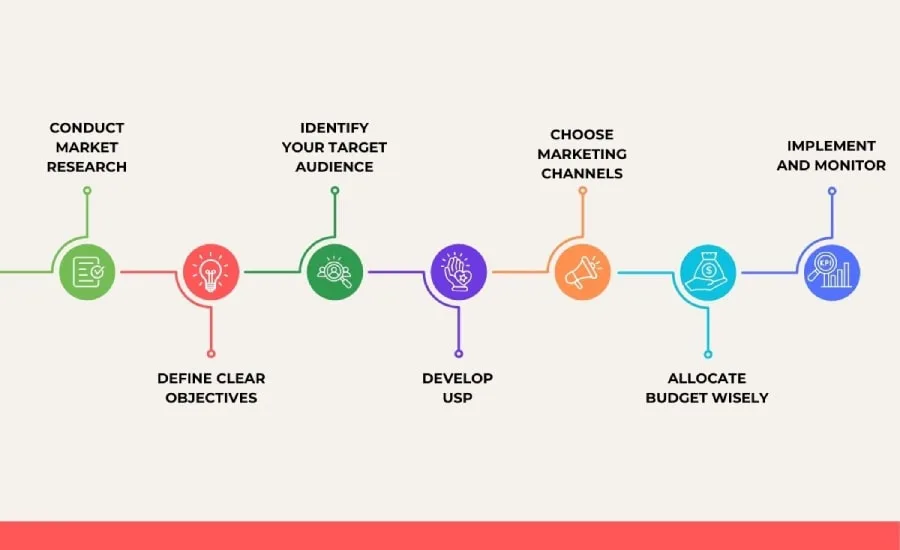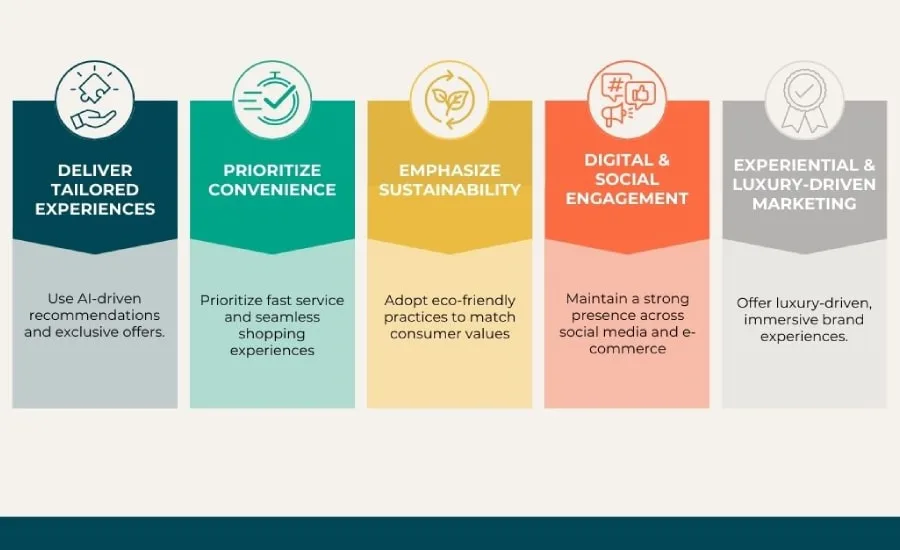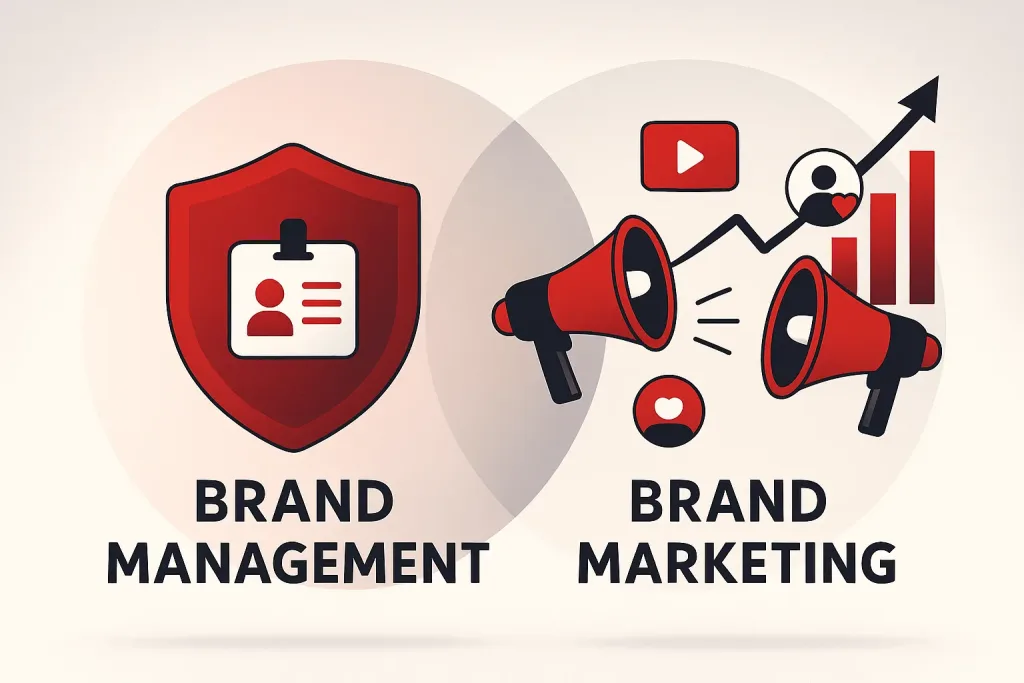Forget the marketing playbook of yesterday. Dubai 2025 is a landscape carved by disruption, where AI isn’t just a tool, it’s the architect of personalized experiences. Consumer expectations? They’re evolving at warp speed. To navigate this dynamic market, you need more than fleeting tactics – you need a revolutionary marketing strategy.
Discover actionable strategies that prioritize empathy and connection, ensuring your brand resonates in a hyper-connected world.
What is marketing strategy
A marketing strategy is a long-term plan businesses use to promote their products or services and gain a competitive advantage. It involves identifying target audiences, understanding customer needs, and positioning the brand effectively in the market.
Philip Kotler, known as the father of modern marketing, defines it as:
“The art and science of choosing target markets and getting, keeping, and growing customers through creating, delivering, and communicating superior customer value.”
So, what is marketing strategy? It’s a well-crafted plan that drives business growth, adapts to market trends, and ensures brand differentiation. A well-crafted strategy can make all the difference.
Discover how our Branding & Marketing Strategy services can elevate your business and set you apart from the competition.
Marketing Strategy Components
An effective marketing strategy comprises several key components:
STP (Segmentation, Targeting & Positioning)
A well-defined STP strategy ensures businesses effectively identify, target, and position their offerings to maximize engagement and conversions.
- Segmentation – divides the market into groups based on:
– Demographic: Age, gender, income.
– Geographic: Location, language.
– Psychographic: Interests, lifestyle.
– Behavioral: Purchase habits, loyalty. - Targeting – Selects the most profitable segment based on size, competition, and alignment with business goals.
- Positioning – Defines the brand’s Unique Value Proposition (UVP) and differentiates it in the market.
Marketing Mix (4Ps or 7Ps)
The marketing mix (4Ps) is a strategic framework that defines what, where, and how a product is marketed and promoted effectively. This framework consists of the following P’s:
- Product – Features, benefits, branding.
- Price – Strategy (premium, discount, competitive).
- Place – Distribution channels.
- Promotion – Advertising, PR, social media.
For service-based businesses, the framework expands to 7Ps, adding:
- People – Employees, customer service, brand interactions.
- Process – Workflow, efficiency, service delivery.
- Physical Evidence – Environment, packaging, brand presence.
Competitor Analysis
Evaluating competitors helps businesses identify market trends, customer expectations, and pricing strategies, allowing them to position their brands effectively.
Marketing Goals
Setting SMART marketing goals ensures all efforts align with business objectives:
- Specific – Clearly defined.
- Measurable – Trackable with metrics.
- Achievable – Realistic within resources.
- Relevant – Aligned with business goals.
- Time-bound – Defined deadline for success.
Budget Allocation
Effective budget allocation ensures resources are spent on high-impact strategies like advertising, content creation, and automation, optimizing ROI while maintaining flexibility for scaling successful initiatives.
Content Creation
Creating engaging content, such as short-form videos, blogs, and social media campaigns, enhances brand visibility. A mix of paid, owned, and earned media ensures widespread reach.
Metrics & Performance Measurement
Data-driven decision-making is key to optimizing marketing strategies. Key Performance Indicators (KPIs) include:
- Customer Acquisition Cost (CAC).
- Conversion Rates.
- Organic Traffic & Engagement.
- Return on Investment (ROI).

How to create a marketing strategy
To develop an effective marketing strategy, follow these essential steps:
- Conduct Market Research: Use surveys, focus groups, and data analytics to understand local consumer preferences.
- Define Clear Objectives: Set SMART goals aligned with your business aims.
- Identify Your Target Audience: Segment the market based on demographics, cultural background, and purchasing behavior to tailor your marketing efforts effectively.
- Develop Your Unique Selling Proposition (USP): Analyze competitors and identify what unique value your product or service offers to differentiate it in the market.
- Choose Appropriate Marketing Channels: It is crucial to utilize platforms where your audience is active, such as social media, search engines, or traditional media, especially for a marketing strategy for startups in Dubai.
- Allocate Budget Wisely: Distribute resources based on the potential return from each channel, ensuring cost-effective utilization.
- Implement and Monitor: Launch marketing campaigns, track performance against key performance indicators (KPIs), and adjust strategies as needed based on data-driven insights.

If you’re looking for tailored branding solutions that help your business stand out, check out our Branding & Marketing Strategy services.
Key Consumer Behavior Trends in general + in Dubai
In 2025, consumer behavior is undergoing significant transformations globally and within Dubai.
Global Trends
- Sustainability — Sustainable consumption is a key driver in 2025, with 73% of consumers who care about sustainability willing to pay more for eco-friendly products. The World Economic Forum and Ellen MacArthur Foundation highlight significant growth in circular business models. While the $1 trillion target for 2025 has yet to be achieved, projections indicate a $4.5 trillion impact by 2030.
- AI-Powered Personalization — Reports indicate that consumers strongly prefer personalized experiences. A McKinsey study found that 71% of consumers expect companies to provide personalized interactions. A study by Epsilon and GBH Insights revealed that 80% of consumers are more likely to purchase from brands that offer customized experiences.
- E-commerce and AR Shopping — By 2025, 24% of total retail sales will be conducted online. Moreover, over 50% of global consumers will use AR/VR for shopping. The global e-commerce market will exceed $7.5 trillion, driven by mobile commerce and AI personalization.
Dubai-Specific Trends
- Luxury & AI Shopping — Dubai’s luxury market is expected to grow by 10% in 2025, driven by high-net-worth consumers and increased tourism. Furthermore, AI in the retail market in the UAE is projected to grow from approximately $16.82 million in 2023 to $157.86 million by 2032, reflecting rising demand for AI-driven personalization in luxury shopping.
- Metaverse & Crypto — UAE’s Metaverse Strategy aims to add $4 billion to the emirate’s GDP and create 40,000 virtual jobs by 2030. Also, 67% of UAE residents are interested in investing in cryptocurrencies within the next five years. As one of the top marketing trends for businesses in Dubai in 2025, companies are increasingly exploring virtual reality, NFTs, and blockchain technologies to engage digital-first consumers.
- Experience-Driven Retail — The UAE’s retail sector is projected to exceed $75 billion in 2025, supported by rising consumer demand, digital transformation, and tourism growth. The market is expanding at a CAGR of 5.7%, reaching $61.89 billion by 2030. AI, AR/VR, and immersive retail experiences like the Dubai Shopping Festival (DSF) continue to enhance engagement, merging luxury with cutting-edge technology.
Cultural Influences on Buying Decisions
In multicultural markets like Dubai, where 88% of residents are expatriates, businesses must adapt their marketing strategies to align with diverse cultural values:
- Religious & Ethical Considerations: Islamic principles shape buying decisions in food, finance, fashion, and wellness. A study shows that 86.5% of UAE consumers prioritize Halal-certified products, emphasizing ethical consumption . The Halal cosmetics market in the GCC is projected to grow from $6.4 billion in 2024 to $26 billion by 2033, reflecting rising demand for Sharia-compliant beauty and wellness products.
- Social Status & Luxury Spending: UAE’s reputation for luxury and exclusivity fuels demand for high-end brands, premium real estate, and exclusive experiences. The luxury goods market in the UAE is projected to reach $6.43 billion by 2025, with a CAGR of 1.67% from 2025 to 2029.
- Multilingual & Digital Influence: Although Arabic is the UAE’s official language, English dominates retail and digital commerce due to its diverse expatriate population. Social media significantly influences buying behavior, with Facebook (66.76%), Instagram (15.67%), and Twitter (6.56%) leading as of January 2025, shaping consumer purchasing decisions.
- Female Consumer Power: Dubai’s population is approximately 3,051,020, with males constituting about 75% and females around 25%. Despite being the minority, women in Dubai exert significant purchasing power, influencing 80% of consumer spending. Emirati women allocate over 40% of their income to fashion, triple that of expatriate women.
Consumer Expectations in Dubai’s Market
Technology, shifting demographics, and evolving preferences are reshaping the UAE’s consumer landscape in 2025. To remain competitive, businesses must effectively refine their marketing strategy to meet these changing expectations.
Hyper-Personalization
Consumers demand tailored experiences, and they are 80% more likely to buy from brands offering personalized interactions. AI-driven tools analyze consumer data and provide customized product recommendations that enhance satisfaction and loyalty.
Omnichannel Engagement
A seamless customer experience is key among the top marketing trends for businesses in Dubai in 2025. B2B companies using strong omnichannel strategies can drive at least 10% annual market share growth.
Gen Z Expectations
Gen Z prioritizes authenticity, speed, and sustainability, with 64% preferring eco-conscious brands. Businesses must emphasize transparency, ethical practices, and fast service to attract this tech-savvy demographic. This is particularly crucial for a marketing strategy for startups in Dubai, where aligning with Gen Z values fosters brand growth and differentiation.
Ultra-Fast Delivery
Rapid delivery is now a consumer expectation, with e-commerce platforms investing heavily in logistics to provide same-day or even faster delivery services.
Sustainability & Ethical Consumption
Sustainability plays a pivotal role in purchasing decisions. The GCC’s clean beauty industry is projected to hit $2.6 billion by 2025, reflecting growing conscious consumerism. As businesses embrace environmentally responsible practices, sustainability remains central to the top marketing trends for businesses in Dubai in 2025.
How to Shape Your Marketing Strategy Based on Consumer Behavior
To stay competitive in UAE’s evolving market, businesses must refine their marketing strategy to align with diverse cultural values:
- Deliver Tailored Experiences — Consumers expect brands to understand their preferences and provide customized recommendations through AI-driven shopping or exclusive offers.
- Prioritize Convenience — Speed is key. From instant customer service to fast delivery, brands that streamline shopping build stronger customer loyalty.
- Emphasize Sustainability — Ethical and eco-friendly practices are no longer optional. Consumers prefer brands that align with their values, through sustainable packaging or responsible sourcing.
- Leverage Digital & Social Engagement — A strong online presence is essential. Brands must integrate multiple channels, from social media to e-commerce, ensuring seamless interactions.
- Create Experiential & Luxury-Driven Marketing — Consumers in Dubai value exclusivity and immersive experiences. High-end personalization, premium services, and interactive shopping environments enhance brand appeal.

Common Challenges Businesses Face in Dubai’s Market
Operating in Dubai’s competitive business landscape comes with unique challenges that companies must navigate to succeed.
- Standing Out in a Competitive Market – With global brands, startups, and SMEs competing for attention, businesses must develop strong branding, digital presence, and innovative marketing to differentiate themselves.
- Finding Cost-Effective Branding Solutions – High advertising costs and premium real estate expenses make budget allocation crucial. Companies must leverage social media, influencer marketing, and localized content to maximize ROI.
- Navigating Cultural and Market-Specific Challenges – Dubai’s diverse, multicultural population requires brands to adapt messaging, respect Islamic values, and comply with local regulations while maintaining broad consumer appeal.
- Shifting Consumer Expectations – Consumers in Dubai expect hyper-personalization, ultra-fast delivery, and sustainability-driven products, requiring businesses to adopt AI, omnichannel strategies, and ethical sourcing.
- Regulatory Complexity – Businesses must comply with licensing laws, labor regulations, and advertising restrictions, which can be challenging, especially for foreign investors.
INNOBASE Transforms Your Brand with Smart Marketing
At INNOBASE, we specialize in Branding & marketing Strategies to help businesses maximize their brand’s impact through tailored strategies designed for visibility, trust, and growth. We provide Custom-Built Consulting Services to Elevate Performance & Growth, ensuring businesses stand out in a competitive market. Don’t miss out on the opportunity to build a powerful brand! Explore our Branding & Marketing Strategy services today and let us help you achieve lasting success.
Marketing Strategy FAQs
What is marketing strategy?
A marketing strategy is a long-term plan to position a brand, engage audiences, and drive growth strategically.
What are the top marketing trends for businesses in Dubai in 2025?
Hyper-personalization, AI-powered marketing, influencer-driven campaigns, and sustainability branding are among the top marketing trends for businesses in Dubai in 2025.
What is the best marketing strategy for startups in Dubai?
The best marketing strategy for startups in Dubai combines SEO, social media marketing, influencer collaborations, and localized content is ideal.



